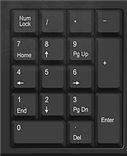阅读理解。
Ask any student which subject he or she hates most. 9 out of 10 students will answer "math". No
matter which country you visit, no matter which grade you are in, you may not learn art, geography,
chemistry or Chinese, but you always learn math. Why is this so? How come so many students hate math,
and yet cannot avoid learning it in school?
Jenny Sanders, a high school student in California, asks, "What good do we get from learning math?
We can use computers to compute numbers, and we can use computers to store information. I think
learning math at school is a waste of time."
However, there is much more to math than just learning to add and subtract (减) numbers. In fact,
math is not so much about calculation (计算) as it is about learning to think logically (逻辑地) and solving
problems. Of course, Jenny was right that we can use computers to do calculations, but how would we
even know how to use the computer if we can't think logically? In short, computers are only tools when
solving problems.
For example, imagine you are a cook and must serve dinner to 100 guests. How should you divide
your resources so that you can get the job done most efficiently (高效地)? In situations like this, the
a bility to think logically will get you to a reasonable answer and solve your problem.
bility to think logically will get you to a reasonable answer and solve your problem.
根据材料内容选择最佳答案,并将其标号填入题前括号内。
1. According to the passage, which subject do students always learn in different grades at school?
A. Chinese.
B. Math.
C. Geography.
D. Art.
2. What does Jenny Sanders think of learning math?
A. Interesting.
B. Boring.
C. Useless.
D. Difficult.
3. Which of the following is TURE according to the passage?
A. 90﹪of the students hate learning math.
B. Students can learn math well with computers.
C. Math can do calculations and store information.
D. Math helps students learn all the other subjects well.
4. What does the underlined word "resources" mean in the passage?
A. 科目
B. 效率
C. 信息
D. 资源
5. What does the writer want to tell us?
A. Math is just learning to add and subtract numbers.
B. Math can be good for both our body and our mind.
C. Math helps us think logically and solve problems.
D. Math can help students find a good job in the future.


 bility to think logically will get you to a reasonable answer and solve your problem.
bility to think logically will get you to a reasonable answer and solve your problem.